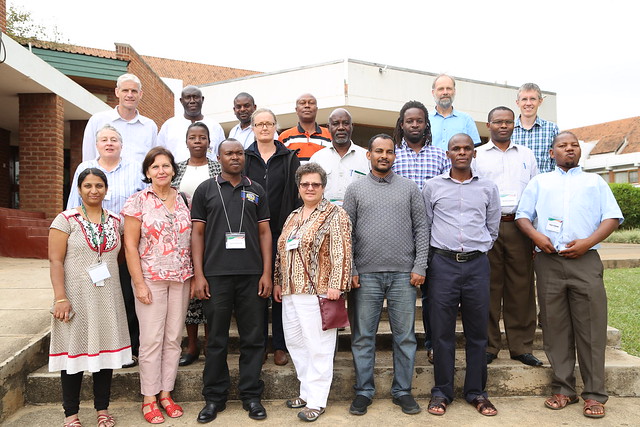Getting ready for phase 2: Africa RISING partners pore over farming systems research design

‘There aren’t any grab and go recipes in participatory farming systems research design. It can only benefit from iterative improvements with time and as we get better at it.’ This statement was the consensual position of participants of a recent scientist’s training on farming systems research design for Africa RISING held 3-4 October in Lilongwe, Malawi.
‘We have been doing component farming systems research without preparing ourselves adequately to design research that brings the different components as “whole” farming systems,’ says Mateete Bekunda, chief scientist, Africa RISING East and Southern Africa project. ‘This has been our main problem, but this training— before the start of phase II activities—will help researchers design their activities with a farming systems focus, and I believe we are now equipped to make better integrated and participatory systems research designs,’
Twenty scientists implementing different Africa RISING interventions took part in the training. They discussed in detail the different methodologies and approaches for farming systems research. Participants also tackled topics like: How ‘participatory’ should systems research be? What are the implications for farming systems research design, considering the added expectations that research needs to contribute directly to development? How best can researchers communicate the inherent tradeoffs posed by the improved technologies they offer to farmers?, and how do Africa RISING project activities contribute to the sustainable intensification domains?
Participants also examined different influence diagram models as case studies to try and tease out the various design questions and relationships that would enable collection of relevant data to address tradeoffs, and how to measure sustainable intensification indicators.
‘This training helped us get to the next step of better systems approach orientation. We can now set clearer objectives and research questions and know how to address them,’ noted Sieglinde Snapp of Michigan State University.
Other interesting discussions at the training (about tradeoffs and participation by farmers) took place in groups where participants drew up various causal loop diagrams on how labour influences farmer choices, how to assess farmer preferences and the use of baselines, controls and farmer practices.
Getting it (farming systems approaches/designs) right and documenting lessons learnt therefore is a significant aspect of Africa RISING deliverable in the coming five years.
Expressing satisfaction with the quality of discussion and level of commitment at the training, Ric Coe, partner at Statistics for Sustainable Development, who led the training, encouraged Africa RISING to continue facilitating and supporting similar courses that allows researchers to reflect more deeply about their work.
The training was organized by the project management team to prepare project partners for appropriate design and implementation of the research-in-development (R-in-D) activities proposed in the newly announced Africa RISING phase II.
Click here for presentations and select pictures from the event.




